Stairlift grants in the UK: Can you get free stairlifts for pensioners?
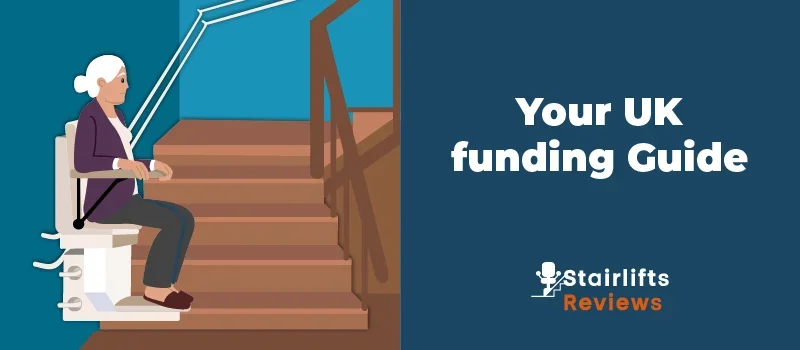
- The most common stairlift grant is the Disabled Facilities Grant, covering up to £30,000 in England, £36,000 in Wales, and £25,000 in Northern Ireland, according to the official GOV.UK guidance. In Scotland, funding is available through your local council.
- Pensioners can get a stairlift for free if they meet grant criteria, which usually depends on mobility needs, the safety risk in the home, and whether the property can be adapted.
- You can’t get a stairlift on the NHS, but an NHS occupational therapist may refer you to a local council grant if your health or mobility requires it.
The average stairlift cost can exceed £5,000 for a curved model, far beyond most fixed incomes. Yet over 50,000 UK households secure adaptation grants each year, and stair lifts are among the top awards. If an occupational therapist says you need one, a council or charity grant could cover most or the whole bill.
This guide explains each scheme, what it pays and how to apply. When you need firm numbers for the forms, compare free stairlift quotes from vetted installers. Clear, itemised prices strengthen your case and speed up the decision.
Use our 30-second form to get up to 4 free quotes now.
On This Page
Financing a stairlift with stairlift grants in the UK
Is it possible to get free stairlifts for pensioners?
Can you get a stairlift from social services?
How to find stairlift grants for your situation?
FAQ
Financing a stairlift with stairlift grants in the UK
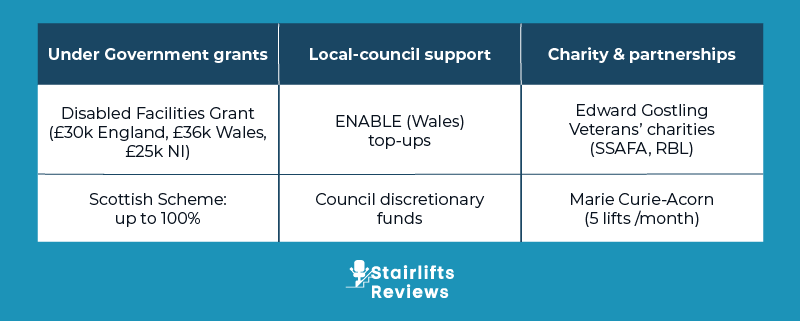
If you’re a pensioner, carer or anyone on a low income, three main routes can ease the cost of a stairlift:
- Government grants: The Disabled Facilities Grant (DFG) pays up to £30,000 in England, £36,000 in Wales, and £25,000 in Northern Ireland. Adults are means-tested, but children under 18 qualify whatever the household income, according to WellChild UK. In Wales, the council-run ENABLE scheme can top up or replace the DFG if your assessment shows extra need.
- Local council support: In Scotland, the Scheme of Assistance covers 80-100% of stairlift costs. Elsewhere, each local council administers the DFG and may add discretionary help. Whether the council will pay for a stairlift depends on your mobility needs, income and whether your home is suitable for adaptation. Rules vary by postcode.
- Charity and non-profit funding: Organisations such as Edward Gostling Foundation, Veterans’ Assistance, and the Marie Curie Partnership step in when public grants fall short. Most focus on low-income households, ex-service personnel or people in end-of-life cycle. Children can also get support through the Family Fund or Caudwell Children.
Even with grant support, you may still face a shortfall. One quick way to trim that gap is through VAT relief. Check VAT rules before applying.
If the stairlift is for personal use and the user is considered “chronically sick or disabled”, you can qualify for 0% VAT relief under His Majesty’s Revenue and Customs (HMRC) Notice 701/7.
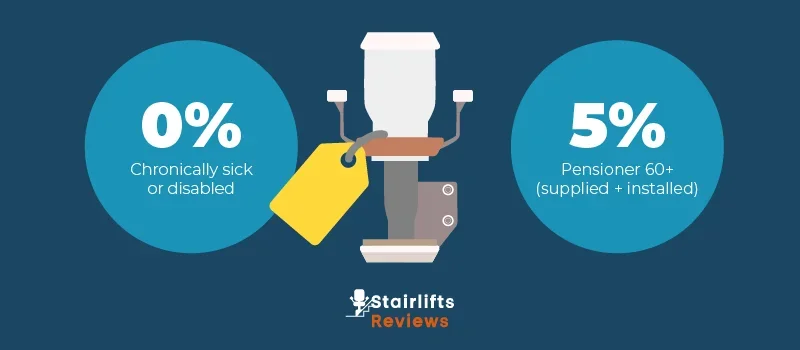
VAT tip for over-60s
If you’re aged 60 and over, you can pay only 5% VAT when the supplier both supplies and installs any of these mobility aids in your home:
- Stairlifts (straight or curved)
- Grab rails
- Access ramps
- Built-in shower seats
- Walk-in baths with sealable doors
The reduced rate comes from HMRC VAT Notice 701/7. Repairs or standalone parts stay at 20%.
In the next sections, we explain each funding route in detail, how to apply, typical wait times and what you can realistically expect to receive.
Disabled Facilities Grant (DFG)
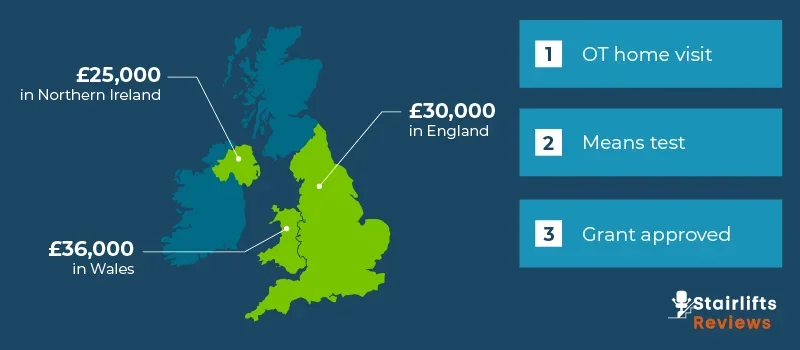
The Disabled Facilities Grant is the UK’s primary, government-funded for major home adaptations. It helps people with long-term mobility needs cover the full cost of a stair-lift and any related building work. Actual award levels vary by council budget and demand, so tread the headline caps below as a maximum rather than a guarantee.
How much you get
You can receive up to:
- £30,000 in England
- £36,000 in Wales,
- £25,000 in Northern Ireland.
Children under 18 can also qualify. Unlike adults, their applications are not means-tested, making the DFG one of the most accessible stair-lift grants for families.
What the grant covers:
- Straight, curved (curved stairlift prices are often higher), or custom stairlifts like a standing stairlift UK, plus full installation.
- Essential changes that make the lift safe to use, e.g. moving a radiator, adding a socket, widening a doorway or trimming steps.
Who can apply:
Homeowners, private or housing association tenants with a long-term disability or mobility issue. The grant is not available for short-term or temporary conditions.
- Adults are means-tested, based on income and savings, but disability-related benefits such as Disability Living Allowance (DLA) and Personal Independence Payment (PIP) are ignored.
- If you receive Pension Credit, Universal Credit or similar income-related benefits, you often qualify for full funding.
- Children under 18 are exempt from the means test; a parent or legal guardian applies on their behalf, and the council will assess whether the stairlift is medically necessary based on the child’s needs.
Understanding the means test
The means test checks your income and savings to decide how much grant funding you can get.
- There’s no fixed income limit; the council looks at your individual situation
- The first £6,000 of savings is ignored
- Any savings above £6,000 count as income (1 per 250 per week)
How to apply for a DFG stair lift:
- Contact your local council’s adult social-care team and request an occupational-therapy (OT) home assessment. If you’ve been searching online for how to get a stairlift from social services, this OT visit is the starting point.
- The OT confirms medical need. When a stair-lift is judged essential, the council issues the Disabled Facilities Grant paperwork. This is your primary route on how to get a stair lift for free through government grants for stairlifts.
- Collect at least two written quotes for supply and installation, then complete the form with proof of income and ownership/tenancy.
- Submit the pack; approval typically takes 30 days, and councils finish the work in a further 95 days on average, according to local-authority performance data for 2024.
Save time on Step 3. We can match you with up to four vetted stairlift installers in under 30 seconds. Their no-commitment quotes give you the exact prices the council needs to see, so you can focus on the paperwork, not on phoning around.
Click below to compare up to 4 itemised quotes and speed up your DFG application.
ENABLE: Support for Independent Living (Wales)
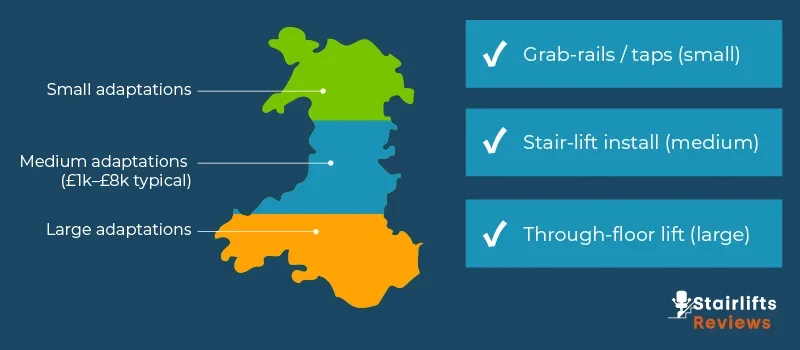
ENABLE is a Welsh-government scheme run through local councils. It sits alongside the DFG and helps older and disabled residents pay for essential adaptations, including stair lifts, so they can stay safe and independent at home (Gov.Wales guidance).
How much can you get
There’s no fixed amount. Your local council will assess what you need and may cover part or all of the stairlift cost, depending on local budgets and your situation. Councils report medium adaptations costing £1,000 – £8,000, but awards can be higher for complex curved stair lifts.
What it covers:
ENABLE offers three levels of support:
- Small changes like grab and stair rails, accessible taps
- Medium adaptations may include various stair lift installations, although straight stairlift prices are more affordable.
- Larger work, like through-floor lifts
Who can apply
Pensioners, older people, or anyone with a long-term disability who lives in Wales. You’ll need a home assessment by an occupational therapist to confirm that a stair lift is essential. ENABLE is open to owner-occupiers, private tenants (with landlord consent) and most social-housing tenants. Medium and large adaptations are means-tested, while small works are usually free of charge.
How to apply
Contact your local council’s housing or social care team; they’ll arrange the OT visit and guide you through the paperwork. Welsh-Government service standards aim for works to begin within 80 working days of approval (Housing Adaptations KPI). Recent data show medium jobs such as stair-lifts average about four months from first enquiry to completion.
Scheme of Assistance (Scotland)
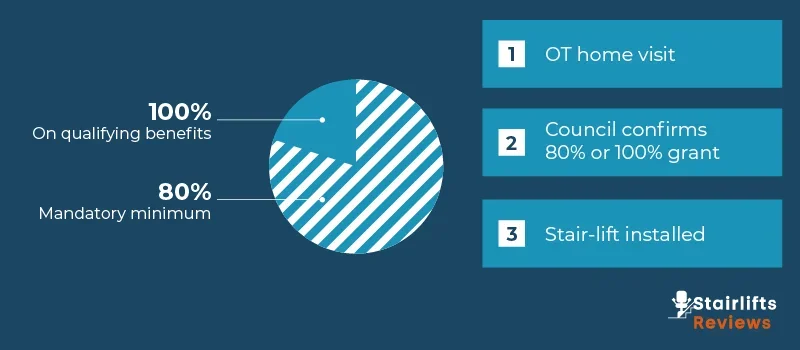
The Scheme of Assistance is Scotland’s answer to England and Wales’s Disabled Facilities Grant. Run by each local council under the Housing (Scotland) Act 2006, it helps older or disabled residents fund essential adaptation, such as straight or curved stairlifts, so they can live safely at home.
How much you can get
- Mandatory grant of at least 80% of the approved cost for eligible adaptations.
- 100% grant if anyone in your household receives Income Support, Income-based Jobseeker’s Allowance (JSA), Guarantee Pension Credit, Income-related ESA or Universal Credit.
- Councils may go above 80% or offer a low-interest loan instead of a grant, depending on local policy, says Citizens Advice Scotland
This means you could qualify for a free stairlift for pensioners or disabled adults if the need is assessed as essential.
What it covers
Supply and installation of straight, curved stairlifts or custom stair lifts. Plus associated works that make the lift safe to use, e.g. moving a radiator or widening a doorway. In blocks of flats, grants can also cover shared-access areas if the lift would be unusable otherwise.
Who can apply
Homeowners, housing association tenants, and most private renters in Scotland. You must have a long-term disability or mobility issue verified by an occupational-therapy (OT) assessment.
How to apply
- Contact your local council’s adaptations team to request an OT assessment, the same first step people take when they search how to get a stairlift on the NHS in Scotland, because the health service funds adaptations through local authorities rather than directly.
- If the OT confirms the stairlift is “necessary and appropriate”, the council will tell you whether you’ll receive a grant (80% or 100%) or a low-interest loan.
- Submit at least one written quote (many councils ask for two).
- The council pays its share directly to the contractor once the lift is installed and signed off.
Typical timeline: most councils aim to approve mandatory grants within 8 weeks, but overall completion can stretch to 4 – 5 months, depending on contractor availability and the complexity of the job.
Edward Gostling Foundation
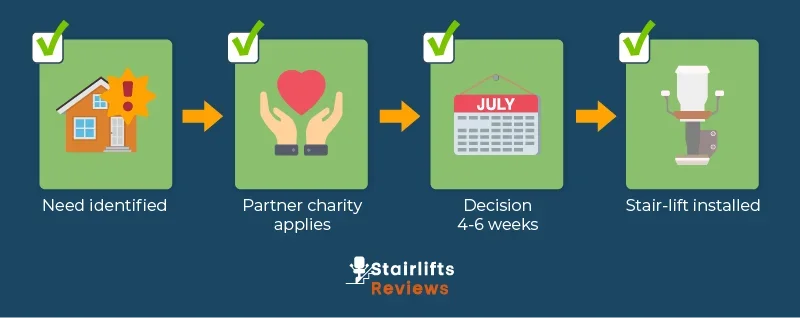
The Edward Gostling Foundation is a UK charity programme that funds essential items, such as a stairlift, for people living with long-term illnesses or disabilities and low income. It often steps in when the Disabled Facilities Grant (DFG) will not cover the full cost or when you do not meet council criteria.
How much can you get
There’s no published cap. Partner charities apply for the amount you need. Annual reports show typical home adaptation grants of £2,000 – £4,000, usually as a top-up to public funding.
What it covers
Supply and installation of straight or curved stairlifts. Plus related safety tweaks, such as grab rails, bannister adjustments, clearing obstacles around the stairs.
Who can apply (all must be true)
You must:
- Live in the UK
- Have medical evidence of a long-term illness, disability or mental health condition
- Household income, roughly £17,000 a year (guideline; trustees case-by-case).
- Supported by a registered charity that’s at least 3 years old (e.g. Age UK, Independence at Home)
How to apply
- Contact a partner charity (Age UK, Independence at Home, local carer’s centre) and ask them to make an Edward Gostling application on your behalf.
- Provide proof of medical need, income and a written stair lift quote.
- The partner charity submits everything through the Edward Gostling online portal. Decisions typically take 4 – 6 weeks.
Because Edward Gostling awards are tailored to the exact funding gap you face, start by collecting written prices from approved installers. See 4 vetted price options here. The itemised costs double as evidence for your partner charity and show the trustees exactly what shortfall they need to cover.
Use the form below to start.
Veterans’ stair lift funding help
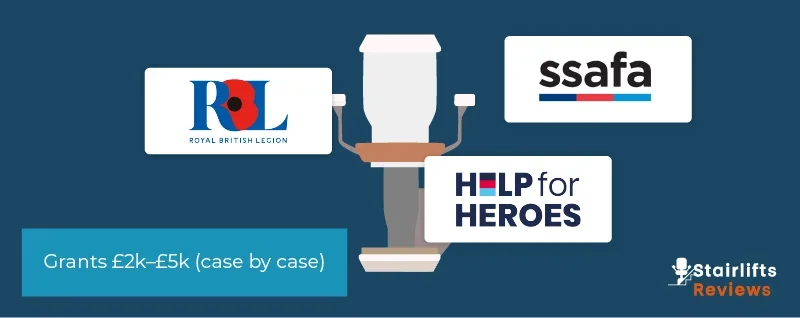
Several UK charities fund home adaptations for former service personnel. If the DFG will not meet the full bill, or you do not qualify, these veterans’ grants can bridge the gap or pay the entire stair lift cost.
How much you can get
There’s no fixed cap. Awards are made case-by-case and often cover all supply and installation costs when the lift is the safest way to restore independence. Recent casework published by advisers cites grants of £2,000 – £5,000 for straight stairlifts or higher sums for curved rails.
What it covers
- Purchase and install straight or curved stair lifts.
- Minor associated works, grab rails, bannister adjustments, doorway widening, all needed for safe use.
Who can apply
You must:
- Be a former member of the UK Armed Forces or an immediate dependent
- Have a service-related disability or household income generally falling below £20,000 – £25,000 (charities verify affordability)
- Show that you’ve served in the UK Armed Forces (e.g. discharge papers), and clinical or OT report showing mobility need
There are 4 main veteran’s stair lift grant providers
- SSFA – The Armed Forces Charity: Volunteers can source funding for mobility aids, including stair lifts. Start here: Call 0800 260 6780 or fill the online Help with Mobility form at ssafa.org.uk.
- Royal British Legion: Its Mobility Aids & Equipment Grants scheme supports stair lifts and wider home adaptations. Start here: Phone 0808 802 8080 or email the grants team via britishlegion.org.uk.
- Help for Heroes: Offers one-off grants for housing adaptations through the Veterans’ Mobility Fund. Start here: Submit the Get Help form or ring 0300 303 9888 on helpforheroes.org.uk.
- Other regimental and local forces charities may contribute if a funding shortfall remains.
How to apply
- Contact one of the charities above, they will assign a caseworker.
- Supply service proof, income details and a stair lift quote. (Most will ask for one or two written estimates).
- The charity liaises with installers and pays the grant directly once the lift is fitted and signed off.
Veterans’ charities aim to decide urgent mobility cases within 4-6 weeks, though timing depends on paperwork and contractor availability.
Marie Curie free stair lift scheme
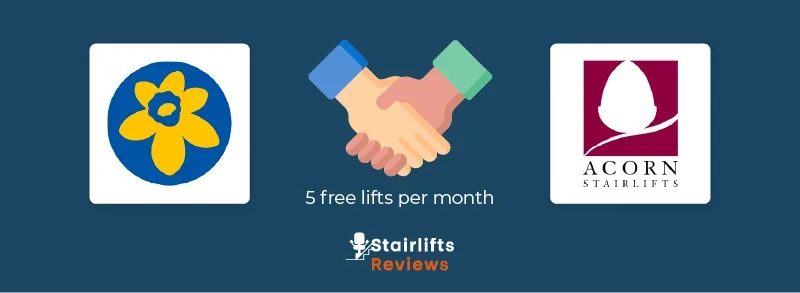
Marie Curie, the UK charity for people living with terminal illness, runs a national scheme that installs stair lifts free of charge for patients receiving its at-home nursing or hospice support. Acorn stairlift supplies the equipment and fitting, allowing patients to stay safe in their homes and freeing up hospice beds.
How much you can get
- 100% of the supply, installation and eventual removal costs.
- Acorn pledges up to 5 lifts per month (roughly 60 per year) exclusively for Marie Curie referrals (Acorn Stairlifts’s community partnership statement).
What it covers
- Straight or curved stair lifts (Acorn’s rapid-fit modular rail if the stairs are curved).
- Minor safety tweaks, e.g. trimming skirting boards, done at the same visit.
Who can apply
You are eligible if you’re already under the care of Marie Curie nurses, hospice staff, or an affiliated community team, have a terminal diagnosis that makes climbing the stairs difficult, and a quick on-site survey confirms your staircase is suitable for a lift.
How to apply
- Tell your Marie Curie nurse or OT that a stair lift would help you stay at home
- The clinician completes an internal referral to Acorn
- Acorn contacts the family within 48 hours to book a survey. Installation usually follows within a week, subject to stock and engineer availability.
Is it possible to get free stairlifts for pensioners?
Yes, pensioners can get a free stair lift fully funded in the UK. The quickest routes are:
- Disabled Facilities Grant (DFG) that covers the entire cost in England, Wales and Northern Ireland when you pass the means test.
- Scheme of Assistance (Scotland) in which the Scottish councils can pay 100% if your OT assessment shows the lift is essential.
- Other back-ups like local council discretionary funds, veterans’ charities, or the Marie Curie- Acorn partnership (for patients already under Marie Curie care).
Everything starts with an occupational-therapy assessment. Once the OT confirms the need, one of the schemes can pick up the bill.
Can you get a stairlift from social services?
Not directly. Social services act as a gateway to funding schemes rather than the purchaser. This is the streamlined route most people follow when searching how to get a stairlift from social services or getting a stairlift on the NHS:
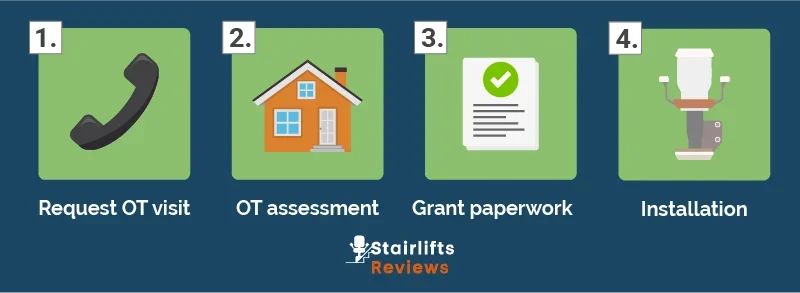
- Request an occupational-therapy (OT) home visit from your local council’s adult social-care team.
- OT confirms medical need. If a stair lift is deemed essential, the council opens a Disabled Facilities Grant (or, in Scotland, the Scheme of Assistance) and handles the paperwork.
- You supply one or two written quotes; the council pays its share straight to the installer once the lift is fitted.
If your staircase won’t fit a fixed model, the OT may instead recommend a mobile stairlift in the UK as a short-term option.
How to find stairlift grants for your situation?
Start with a written quote. Until you know the price, a council or charity cannot decide whether to fund the whole amount or just part of it. A clear, itemised quote also proves you’ve compared suppliers and aren’t over-budgeting.
Next, book an occupational-therapy assessment through your local council or social services team. If the OT confirms a stair lift is essential, they will point you to the most suitable grant, whether that’s a Disabled Facilities Grant, the Scottish scheme of assistance or a charity top-up.
If you discover you’re not eligible for a grant, you still have options: look at reconditioned stairlifts, short-term rental or low-interest finance to spread the cost.
We can make the first step effortless. Click below to compare up to 4 non-binding stair lift quotes from our network of qualified installers. The detailed costs will strengthen any grant application and show exactly where a funding gap exists.
The information on this page has been confirmed by Alex Muir, our expert stairlift contributor/consultant from our trusted partner EMS Lifts.
FAQ
Can disabled persons get a stairlift grant?
Yes, options include the Disabled Facilities Grant up to £30,000 England, £36,000 Wales, £25,000 Northern Ireland), Scotland’s Scheme of Assistance (up to 100%), and charity help such as the Edward Gostling Foundation or veterans’ fund.
Do you pay VAT on stairlifts?
Not if the user is chronically sick or disabled he or she may qualify for 0% VAT relief, and pensioners aged 60+ can pay only 5% when the supplier both supplies and installs the lift.
Are there government grants for stairlifts available for kids?
Yes, the Disabled Facilities Grant covers the full cost for under-18s, with no means test on household income.







